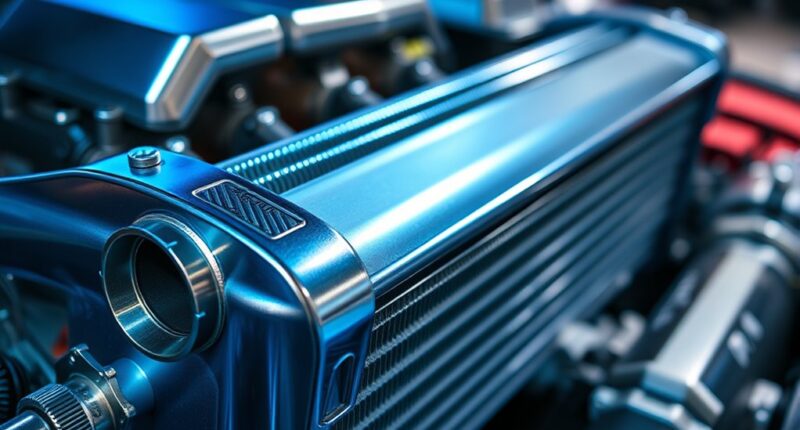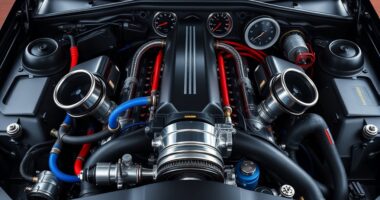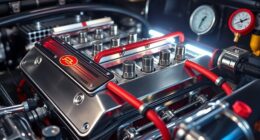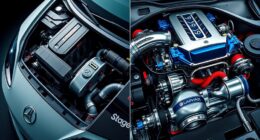Upgrading your intercooler helps keep intake temperatures low by improving cooling efficiency and airflow. This prevents heat soak, reduces power loss, and lowers the risk of engine knock during high-performance driving. Ensuring proper turbo sizing and optimizing airflow through better piping and placement also boosts cooling efficiency. When these upgrades work together, you’ll notice better throttle response, more consistent power, and a cooler engine. Continue to explore how these enhancements can maximize your vehicle’s performance.
Key Takeaways
- Upgrading to a larger, high-flow intercooler improves heat dissipation, maintaining lower intake temperatures during high-performance driving.
- Proper turbo sizing ensures consistent airflow, reducing heat buildup caused by over- or under-sized turbos.
- Optimizing airflow pathways with smooth piping and strategic intercooler placement minimizes turbulence and heat transfer.
- Combining intercooler upgrades with ECU tuning helps control boost levels and fuel mixture, preventing excessive heat generation.
- Enhancing overall system airflow and cooling components creates a more efficient setup, keeping intake temperatures consistently low.

Ever wondered how to boost your vehicle’s performance? One of the most effective ways is by upgrading your intercooler to keep intake temperatures low. When you’re pushing your car harder, especially with forced induction setups, high intake temperatures can sap power and increase the risk of engine knock. That’s where intercooler upgrades come into play, but to get the most out of them, you need to consider turbo sizing and airflow optimization. These factors work hand-in-hand to ensure your engine breathes efficiently and stays cool under pressure.
First, understanding turbo sizing is essential. An appropriately sized turbo impacts how much air your engine gets and how quickly it responds. A turbo that’s too small can limit airflow, causing boost lag and reduced power, while an oversized unit might generate excessive heat, which defeats the purpose of an intercooler upgrade. By selecting the right turbo size, you optimize airflow, ensuring your engine receives a steady, controlled supply of compressed air. This setup allows your intercooler to function more effectively, cooling down the air before it enters the combustion chamber. Proper turbo sizing also helps maintain a balance between boost pressure and intake temperature, preventing unnecessary heat buildup.
Choosing the right turbo size balances airflow and prevents excess heat buildup.
Airflow optimization is equally important. You want to maximize the volume of air passing through your intercooler without creating restrictions. Upgrading your intercooler alone won’t cut it if the airflow is hindered elsewhere in the intake system. Consider upgrading your piping, ensuring it’s smooth and free of bends that cause turbulence. Adding high-quality clamps and seals helps prevent leaks that could reduce pressure and airflow. Proper placement of the intercooler is also key—installing it in a location with maximum exposure to airflow, such as in front of the radiator, allows it to dissipate heat more efficiently. Additionally, tuning your vehicle’s ECU can optimize the air-fuel mixture and boost levels, further enhancing airflow and cooling performance. Upgrading other components like the intercooler core can significantly improve heat dissipation, making the entire system more effective.
Together, turbo sizing and airflow optimization create a synergy that dramatically lowers intake temperatures. A well-sized turbo provides a steady flow of compressed air, while optimized airflow pathways ensure that air remains cool and dense as it reaches the engine. This combination results in improved power, better throttle response, and increased reliability. Remember, the goal isn’t just to upgrade the intercooler but to create a comprehensive system that manages heat and airflow effectively. When these elements work together, you’ll notice a significant boost in performance and efficiency, making your vehicle more responsive, cooler-running, and capable of handling higher power outputs without overheating.
Frequently Asked Questions
What Are the Signs of an Intercooler System Failure?
If your intercooler system starts failing, you’ll notice signs like temperature fluctuations during driving, indicating it’s not cooling properly. Leak detection becomes essential, as leaks can cause pressure drops and reduced efficiency. You might also experience a loss of power or rough engine performance. Keep an eye on these symptoms; early detection helps prevent further damage and keeps your intercooler functioning effectively.
How Often Should Intercooler Maintenance Be Performed?
You should perform intercooler cleaning and inspections every 10,000 to 15,000 miles or as recommended by your vehicle’s manufacturer. Regular inspection allows you to spot signs of clogging, leaks, or damage early. During maintenance, check the intercooler’s core and hoses, ensuring there’s no debris or corrosion. Adopting a consistent inspection schedule helps maintain peak cooling performance, keeps intake temperatures low, and prevents potential intercooler failures.
Can Intercooler Upgrades Improve Fuel Efficiency?
Upgrading your intercooler can improve fuel efficiency by enhancing turbo efficiency and optimizing air intake temperatures. When your intercooler effectively cools intake air, your engine runs more efficiently, reducing fuel consumption. Plus, these upgrades often lead to power gains, giving you better performance without sacrificing fuel economy. So, if you’re seeking a balance of power and efficiency, an intercooler upgrade is a smart choice that benefits both aspects.
Are There Any Vehicle Models That Can’t Benefit From Intercooler Upgrades?
Some vehicle models can’t benefit from intercooler upgrades due to model limitations and factory compatibility issues. If your car’s design doesn’t support aftermarket intercoolers or has a non-standard setup, upgrading might not improve performance or efficiency. You should check your vehicle’s specifications and consult with specialists to determine if an upgrade is feasible. Not all models are designed for intercooler improvements, so understanding these limitations helps you make informed decisions.
What Are the Best Materials for High-Performance Intercoolers?
You should prioritize aluminum as a core material for high-performance intercoolers because it offers excellent heat dissipation and lightweight efficiency. Aluminum’s thermal conductivity helps keep intake temperatures low, boosting your engine’s performance. Look for intercoolers with thick, well-constructed cores made of aluminum, as they provide better cooling capacity. This combination ensures your vehicle maintains ideal intake temperatures, especially during demanding driving conditions or high boost situations.
Conclusion
Upgrading your intercooler is like giving your engine a gust of fresh air, helping it stay cool and perform at its best. By lowering intake temperatures, you prevent power loss and reduce the risk of engine knock. Think of it as your car’s personal acupuncturist—keeping everything balanced and in harmony. Don’t let heat hold you back; with a quality intercooler, you’re steering your ride toward cooler, more efficient performance every time you hit the gas.









